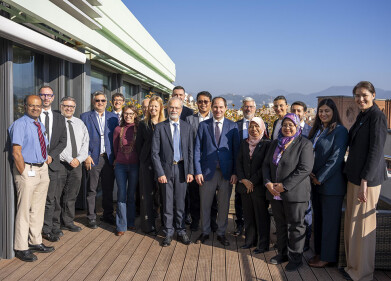Air clean up
Sustainable Emissions Control Offering for Managing VOCs, HAPs and Odours in Industrial Facilities
May 21 2013
Envirogen Technologies (USA) announced the launch of a new technology offering, designed to help industrial facilities manage their air emissions performance and meet regulatory and permit requirements through the control of volatile organic contaminants (VOCs), hazardous air pollutants (HAPs) and odours. The Envirogen Sustainable Emissions Control offering features the use of both biological and enhanced adsorption treatment technologies to address a broad range of contaminants covered under the Clean Air Act and state air quality regulatory programs. Used alone or together, the two technology approach allows Envirogen to treat organic and inorganic, polar and non-polar emission constituents at varying concentrations and air flow rates. These emission control solutions can be an order of magnitude less expensive than those provided by traditional emissions control technologies, while at the same time reducing chemical and energy consumption, providing recycle/re-use options and lowering overall carbon footprint. The initial applications for Envirogen Sustainable Emissions Control will be in refinery and chemical manufacturing facilities, but the solutions are applicable in a broad range of manufacturing environments.
According to Rob Loken, Vice President, Product Management for Envirogen, the Sustainable Emissions Control offering has been designed to help environmental managers and engineers reduce the long-term costs for meeting air quality regulations that can impact the facility permitting process. “Because of tight limits and complex manufacturing processes, meeting today’s air quality regulations often requires remarkably sophisticated technical solutions that can be very costly and difficult to manage,” he said. “With our Sustainable Emissions Control offering, Envirogen is putting our years of experience treating vapour phase streams both biologically and with advanced adsorption technology to work in solutions that are the most sustainable on the market today. When we say sustainable, we mean that they are high performing, environmentally sound and safe. We also mean that these solutions feature very low long-term operating costs – costs that can be predicted and guaranteed,” he added.
Envirogen offers a range of biological treatment systems for use in controlling industrial air emissions – including biofilters, biotrickling filters and combinations of the two technologies. The natural process of biofiltration uses microorganisms fixed to a porous filter bed medium to metabolise pollutants present in an air stream – consuming them as food or as an energy source. The end products of this degradation are typically water vapour, carbon dioxide and mineral salts. Biological treatment is ideally suited for contaminants that are water-soluble, polar and readily biodegradable. They are particularly effective for low loading applications at high flow volumes – including odours caused by hydrogen sulphide (H2S) and other reduced sulphur compounds. Biological treatment offer low energy consumption, chemical usage and significantly lower long-term operating costs.
Introduced in November of 2012, Envirogen’s EnviroHPA Systems feature ultra-high performing adsorbent media in systems designed, guaranteed and operated by Envirogen under multi-year agreements. As part of the Sustainable Emissions Control offering, EnviroHPA Systems compete effectively with other technologies that handle non-polar compounds at high loading and flow rates. For industrial vapour phase treatment applications, Envirogen employs synthetic adsorbents manufactured by The Dow Chemical Company (DOW). These adsorbents offer a very high surface area and optimised pore size distribution – characteristics that offer substantially increased absorption capacity, rapid adsorption kinetics, a range of desorption options and excellent physical and chemical stability. Faster kinetics and higher contaminant loading translate into higher hydraulic rates with a smaller system footprint – decreasing operations and maintenance costs for the treatment process and lowering initial capital expenditures for overall site improvements and utilities. Enhanced desorption characteristics allow media to be regenerated in place with heat, steam, aqueous acids or bases – leading to an extended media bed life in use. In facilities that use high volumes of activated carbon, EnviroHPA Systems can offer cost reductions of up to 50%, with carbon footprint levels reduced by as much as two-thirds. In addition to these advantages, EnviroHPA Systems offer the option for recycle/re-use because of the desorption properties of the advanced media.
Envirogen offers EnviroHPA Systems as a service in which system design and installation, media costs, regeneration and disposal are charged as an operating fee over the life of the system. They can be offered with low- to no-capital investment, guaranteed performance and predictable costs over the service life of the installation.
According to Loken, the complex nature of industrial emissions – which often feature a variety of different types of contaminants with differing regulatory profiles – recommends a tailored solution that applies the best technology for individual and combined emission streams. “Within the realm of emissions control technologies, different approaches have their niche in terms of cost/performance. With our Sustainable Emissions Control offering, we are bringing together two complementary technologies that are more efficient, more cost effective and more sustainable than what is available on the market today. By pairing them, we can extend the applicability of these solutions and fit them into an overall plan for emissions control for an industrial facility. That plan can form the basis of a long-term, cost-effective, sustainable solution for the facility,” he said.
Events
Carrefour des Gestions Locales de L'eau
Jan 22 2025 Rennes, France
Jan 29 2025 Tokyo, Japan
Feb 05 2025 Nantes, France
Feb 16 2025 Kampala, Uganda
Feb 26 2025 Chennai, India










